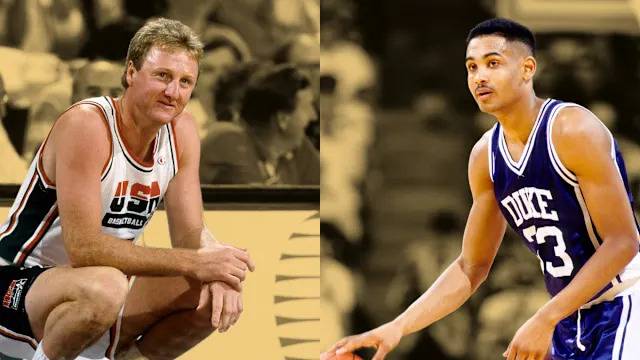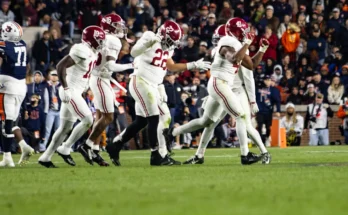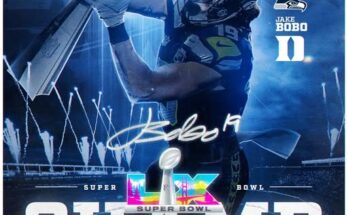“‘YOU GUYS ARE PARTYING, I’M PUTTING IN WORK’: The Chilling Larry Bird Elevator Encounter That Lit a Fire in Young Grant Hill and Changed His Path to NBA Stardom Forever”
Grant Hill’s story is already the stuff of basketball lore—a generational talent, a Duke legend, a graceful force on both ends of the floor, and a player whose legacy was carved out through perseverance, class, and brilliance. But even legends have moments that shape them. For Grant Hill, one such moment came in the most unlikely of places: a quiet elevator ride in 1992. He wasn’t on the court, wasn’t running drills or making plays. He was just a college kid from Duke, riding the elevator in Los Angeles, surrounded by other student-athletes at a college all-star event. But what happened in that confined space would etch itself into his memory with a sharpness that not even time could dull. The man who ignited that lifelong flame in Hill? None other than Larry Bird. And he didn’t need to lace up or launch a three-pointer to do it. Just one sentence—blunt, savage, and absolutely unforgettable.
The summer of 1992 was a whirlwind of energy and promise for college basketball. The Dream Team had captivated the world, and a new generation of players—eager, raw, and hopeful—watched in awe as legends redefined the sport on a global stage. Grant Hill, then just entering his sophomore year at Duke, was already known as a prodigy. Tall, smooth, articulate, and intelligent, he had the poise of a pro and the game to match. He was in Los Angeles that summer to take part in an NCAA-sponsored program, a gathering of college stars selected to attend educational workshops, media training, and promotional events. It was part basketball camp, part life-skills training, part party. Most of the athletes were enjoying the moment, soaking in the Southern California vibe, the celebrity sightings, and the glamorous scenery. But not everyone was taking it easy.
On one of those nights, Hill and several other young athletes—buzzing from an evening out—piled into the elevator of the team hotel. Laughs bounced off the walls. The atmosphere was light, casual, carefree. Then the elevator stopped, the doors slid open, and in stepped a man who needed no introduction. Tall, reserved, grizzled by the grind of greatness, Larry Bird entered with a gym bag slung over his shoulder and sweat still dripping from his brow. He had been working out—alone, at night, with no cameras or coaches watching. The laughter in the elevator faded into silence as Bird stood among them, stone-faced and focused. The air shifted. And then, without turning to face them, without so much as a smirk, Bird dropped a line that would pierce the heart of every young man in that elevator.
“You guys are partying,” he said flatly, eyes forward. “I’m putting in work.”
That was it. No follow-up. No smile. Just a simple, brutal statement of fact. The elevator continued to rise, but in Hill’s mind, time froze. He was stunned—not offended, not embarrassed, but humbled. Bird wasn’t mocking them. He wasn’t trying to grandstand or deliver a lecture. He was simply living his truth, and offering an unfiltered glimpse into the mindset of a champion. Larry Bird—NBA MVP, Finals hero, the embodiment of toughness and work ethic—had taken one look at a group of wide-eyed college stars and reminded them that greatness isn’t handed out at award shows or on highlight reels. It’s earned. Quietly. Consistently. In the dark, when nobody’s watching.
For Grant Hill, that one line would echo in his soul for years to come. It wasn’t just about the workout or the contrast between fun and focus. It was about identity. About choosing who you want to be. That encounter became a mental bookmark in his life—one that he would return to every time he felt tired, or distracted, or unsure of the path forward. The elevator ride turned into a metaphor. Were you going to party your way through potential? Or were you going to put in the work like Bird did, night after night, year after year?
Hill’s career unfolded with that internal compass constantly guiding him. At Duke, he was the cornerstone of Mike Krzyzewski’s back-to-back championship teams, and by his senior year, one of the most respected leaders in college basketball. His game was unselfish but electric—he could score, pass, rebound, defend, and inspire. Every time he was doubted, he responded not with bravado, but with discipline. Every moment that could’ve swelled his ego, he met with humility. That elevator moment wasn’t just a spark—it was a blueprint.
When he entered the NBA in 1994, the league was undergoing a generational shift. Michael Jordan was temporarily retired. The league was searching for its next set of stars. Hill wasted no time making his mark, winning Co-Rookie of the Year honors and drawing comparisons to Magic Johnson for his all-around brilliance. But he never let the spotlight blind him. He kept working, kept grinding, kept chasing the quiet excellence that Bird had personified that summer in L.A.
Even in the face of adversity—especially when injuries threatened to derail his prime—Hill leaned on that early lesson. He spent years battling through ankle surgeries, setbacks, and missed seasons. The world saw the headlines and the frustration, but behind the scenes, Hill never stopped putting in the work. He rehabbed with the same energy he once brought to the court. His return to relevance with the Phoenix Suns in the twilight of his career was no accident. It was the result of a mindset that had been forged long ago—an unshakable belief that effort, not applause, defined greatness.
What made the Larry Bird elevator moment so powerful wasn’t just what was said. It was who said it, and when. Bird wasn’t there to impress anyone. He was at the tail end of his playing days, his back battered, his minutes limited. But he still showed up to train. Still carried that gym bag. Still lived by the code that had made him a legend. For young athletes like Hill, it wasn’t a story to admire—it was a challenge to rise.
Over the years, Grant Hill has shared that moment with reverence and gratitude. In interviews and speeches, he recalls the encounter not as an embarrassing scolding, but as a sacred reminder. He recognizes the power of example—that greatness often shows itself not through grand speeches, but through small, profound moments of truth. The elevator ride wasn’t about Larry Bird trying to change lives. But it did. Because Hill was listening. Because Hill was ready. Because somewhere deep down, he already knew what he wanted to become.
In today’s sports world—where brand building, social media, and highlight culture dominate the landscape—the story of that 1992 elevator ride still matters. It’s a reminder that the path to excellence doesn’t always come with cameras and fanfare. Sometimes, it comes with sweat, silence, and a savage line that lands like a thunderbolt. It’s about choosing to be the one who puts in the work, not just when it’s convenient, but when no one else will.
Grant Hill became a Hall of Famer not just because of his talent, but because of his mindset. And that mindset was forever altered on a random night in Los Angeles, in the presence of a legend who didn’t have to say much to say everything. Larry Bird didn’t need to lecture the kids in that elevator. He just lived his truth and let the truth speak for itself.



